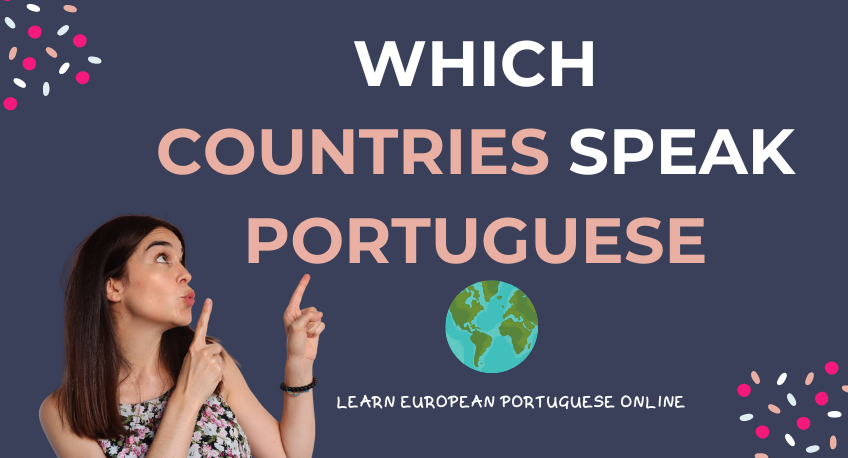You might have asked yourself which countries speak Portuguese. Well, not the countries themselves, obviously, but the people that live in them hihi. Well, in today’s post I try to address this question and I will also give you some insights about the history of the Portuguese speaking countries. Let’s go? =)
You can watch this topic also on my YouTube channel:
Portuguese speaking countries
Europe
Portugal
Inhabitants: 10,839,514
Capital: Lisboa
Portuguese is the native language of Portugal.
History:
Portuguese originated from Latin, brought by the Romans into the Iberian Peninsula. Archaic Portuguese developed in the V century AC as a Romanic dialect called the Galician-Portuguese. It stayed like this till the Renaissance, when it officially became Portuguese.
Since then, it has suffered some mutations and alterations to its grammar structures and vocabulary. The last one was the New Orthographical Agreement of the Portuguese Language of 1990, which was signed by most Portuguese speaking countries, in order to give uniformity to the Portuguese language across all those countries. A lot of controversy has been taking place due to this Agreement with many critics defending it is not being adopted by all countries in the same way. In Portugal, most critics claim that the biggest reason for this attempt at unifying the language is economical rather than for the best interest of the language and its culture.
Portuguese is now widely-spoken, due to its power during colonial periods. Next, let us take a look at the countries and regions where we can hear this beautiful language in all its variations.
South America
 Brazil
Brazil
Inhabitants: 207,353,391
Capital: Brasília
Portuguese is the native language.
History:
- Brazil is the largest Portuguese-speaking country in the world and the only Portuguese speaking country in America. Brazilian Portuguese is very similar to European Portuguese. However, the accent of these two Portuguese variants is quite different, a bit like American English and European English. There are also some differences in grammar and vocabulary (check here for more info).
- Brazil was one of the “crown jewels” of Portuguese colonization. Around 1500, a man named Pedro Álvares Cabral discovered Brasil and the Portuguese slowly started migrating to the country. The Portuguese language was then brought to Brazil during this colonial period (ca 1500-1800).
- The Portuguese took a lot of the Portuguese culture to Brazil, but the opposite also took place. Nowadays, Brazil culture is well present in Portugal. The Portuguese like to watch Brazilian “telenovelas”, listen to Brazilian music, try Brazilian food and travel to Brazil, among other things.
Africa
Angola
Inhabitants: 29,310,273
Capital: Luanda
Portuguese is the official language; However, most of the Angolan people have one of the African languages found in the region as first language.
History:
- Angola was also one of the Portuguese colonies. While Brazil saw its independence much earlier, Angola kept being a colony up until the middle of the 20th century. In fact, after some war years between Portugal and Angola, its independence only occurred in 1974, after the Portuguese dictatorship was abolished.
- 85 % of Angolan people are still fluent in Portuguese till this day, with as much as 75 % of households using it as first language; However, this happens more in the big cities, while much less in the rural areas, where people prefer the African languages as their household language.
 Mozambique
Mozambique
Inhabitants: 26,573,706
Capital: Maputo
Portuguese is the official language; However, it is spoken as a second language by the majority of its population.
History:
- Like Angola or Brazil, Mozambique is a former Portuguese colony. Like Angola, it only got its independence after 1975, when the Portuguese dictatorship ended.
- Around 50% (80% in urban areas, 35% in rural areas) of the population is fluent in Portuguese. However, the language is used as a second language, with the majority off people choosing some of the African languages found in this area as first language.
- Mozambique has a big influence from Portugal, but the opposite is also true. This can be seen in food, music, art, movies, traditions, etc.
Guinea-Bissau
Inhabitants: 1,792,338
Capital: Bissau
Portuguese is the official language but it is spoken only by minority as a native language [around 27% of the population].
History:
- Along with Angola and Mozambique, Guinea was a Portuguese colony from mid-1600s till around 1974.
- Only up to 27% of the people are native in Portuguese; The “língua-franca” is Guinea-Bissau Creole/Portuguese Creole, which is spoken by more than half of the population. This language is a mix between Portuguese and the regional African languages and most of the people use it as a first language.
 Equatorial Guinea
Equatorial Guinea
Inhabitants: 778,358
Capital: Malabo
Portuguese is spoken by a significant minority as a native language.
History:
- Main official languages: Spanish (spoken by 70 % of the population) and French.
- Portuguese in an official language in this country only since 2010. Guinea adopted Portuguese as an official language to be able to join the CPLP (Community of Portuguese Language Countries). Portuguese is now being taught to children in primary schools as a Government policy to promote the language.
Cape Verde
Inhabitants: 560,899
Capital: Praia
Portuguese is the official language and it is spoken by the majority of the population.
History:
- Cape Verde was also a Portuguese colony from mid-1500s to 1975;
- Portuguese is used in the news, radio, TV and official documents. It is also used as an official language in schools. However, Cape Verdean Creole (kind of a Portuguese-based creole) is used in everyday interactions, instead of Portuguese.
 São Tomé and Príncipe
São Tomé and Príncipe
Inhabitants: 201,025
Capital: São Tomé
Portuguese is the official language and it is spoken by the vast majority of the population as a native language.
History:
- São Tomé e Principe was another colony that only had its independence in 1975.
- There are other creoles which are spoken in São Tomé, but Portuguese has a strong presence in the country.
Asia & Oceania
East Timor
Inhabitants: 1,291,358
Capital: Dili
Portuguese is spoken by a small minority as a native language -> less than 1000 people are native in Portuguese with the majority having Tetum as their native language.
History:
- Timor is located in Southeast Asia and it is known by its amazing beaches. Timor was a Portuguese colony between 1500 and the 20th century. Along with other countries above mentioned, Timor became independent in 1975;
- Its official languages are Portuguese and Tetum, but Portuguese has a very small presence in the country nowadays.
 Macao
Macao
Inhabitants: 601,969
Capital: Macau
Like in Timor, Portuguese is spoken in Macau by a small minority as a native language.
History:
- Nowadays, Macau is in the administrative region and it belongs to China, but it belonged to Portuguese administration until the year 2000!
- The official languages of Macau are Chinese and Portuguese. However, in the household only a minor part speaks Portuguese as a native language (most speak Chinese).
 Goa
Goa
Inhabitants: 1,817,000
Capital: Panji
Portuguese is spoken only by well-educated, older people.
History:
During the Portuguese colony period, Portuguese was one of the official languages of Goa. Nowadays, however, it is not anymore. In fact, only some older and well-educated people still speak it, which means that Portuguese has lost most of its power in the territory.
Member States of the Community of Portuguese Language Countries
Please note that Portugal, Brazil, Angola, Mozambique, Guinea-Bissau, Cape Verde, Equatorial Guinea, São Tomé and Príncipe, and East Timor belong to the Member States of the Community of Portuguese Language Countries (Comunidade dos Países de Língua Portuguesa; CPLP). All of the 9 member states have Portuguese as their official language and were mostly former Portuguese colonies.
Moreover, I would like to add that especially in South America, there are small Portuguese “communities” in countries like for example Uruguay, Venezuela, Argentina and Paraguay.
I hope you enjoyed my article and know now which countries speak Portuguese. I would love to hear if you have ever been in any of those countries and / or if you heard Portuguese in any other countries? In case you have any questions or corrections, please feel free to leave a comment below. I will definitely take a look at it and answer you
Beijinhos,
Mia.



The countries of Niger-Mali-Burkina Faso dropped French for other local Languages should Angola-Mozambigue-Guinea Bissau former Portuguese colonies in Africa should they drop Portuguese for other local Languages?
Olá, Lucas!
This is a great question, and I am not sure how to respond to that. If the countries find the best option is to drop Portuguese, I guess they could go this way. However, I don’t think it should be compulsory, but it should be adapted to the reality of each region. I hope this makes sense!
As an Angolan, will Portuguese ever be a U.N. Language??
Olá
I am not sure, actually. That’s a good question.
No.. Portuguese is to small of a language to ever be a U.N. language.
In order for that to happen a Brazilian told me Brazil will have to be torn to 8-10 countries. Then he is confident Portuguese would become a U.N. language. It’s to small of a language compared to English, Spanish, French, Arabic, which are spoken in over 20 countries each.
Here in Chicago, Illinois we definitely need Portuguese classes taught by expert’s on the language rather than just the Polish, Chinese, Spanish that are taught to students without them having a real choice. Portuguese experts need to put more emphasis on the youth like the Chinese & Spanish folks are. That’s why all you see here are Chinese & Spanish signs, Radio, TV stations to name a few.
Olá
Ah, yes, I understand. Maybe they could also follow some online courses? I have a lot of online courses, that can be followed from anywhere in the world. You can check such courses here:
https://school.learn-portuguese.org/courses/
Maybe I would just have to find a way to spread the word about these online courses over there.
Thank you for your message, and have a nice day.
Beijinhos,
Mia
As an Aussie would you recommend Chinese or Spanish or Portuguese or French when I go work in the U.S. for college especially in the state of Massachusetts, where Portuguese is the 3rd most spoken language behind Spanish and English.
Olá

Unfortunately, I am not sure I am the right person to answer this question, because I think I would have to know more about Massachusetts and how the languages are used over there. I know you say it is the third most spoken language. But is it spoken outside, in everyday life and affairs? Or is it just spoken within the Portuguese community, at home, for example? I think it would be good if you could ask someone that is living there, and that can better give you an answer about the situation there
I am sorry that I cannot further help, but I hope that you find the right path for yourself.
Beijinhos,
Mia
I’m from Sofia, Bulgaria who plans on visiting Southern American next year, I’m currently studying Spanish will that be enough to get me to every country including Brazil? Since almost everyone tells me that they are the same. And then I plan on Visiting American Central, where they mainly Speak Spanish, Tribal languages & English. And then Texas U.S.A. Would I have to learn Portuguese or Portunol as they call it or will my French and soon to be Spanish be enough? Thank You.
Olá

I am not sure if you have already gone on your trip, but I would say that if you want locals to understand you better in Brazil, you should try to learn a few sentences in Portuguese – as Portuguese is a little different from Spanish. Locals might still understand you, but it is not their language, so it might be that some people don’t.
If you go to the other South American and Central American countries, I believe Spanish will be good
I hope this helps!
Beijinhos,
Mia
I’m always disappointed that I can’t find a good Portuguese learning center here in the U.S.A. Most folks around here in Miami, Florida always say that I’m wasting my time, and that I should learn either Spanish or French which is also spoken here others have said even Chinese. It’s pretty frustrating to say the least.
Yes, I can understand that. But you could also try to learn online.
Have you checked my online courses? They could help you
You can check them here:
https://school.learn-portuguese.org/courses
Take a look at them, and if you have any questions, let me know.
Beijinhos,
Mia
I will do just that. Thanks much
Why is it that here in The nice state of Florida, the only languages I see are Spanish+French? It upsets me that someone who wants to learn another romance, language are left out in the cold as they say!
Olá Thank you for your comment. If you are looking for resources to learn Portuguese from Portugal, you can try, for example, my free Kickstarter Course here:
Thank you for your comment. If you are looking for resources to learn Portuguese from Portugal, you can try, for example, my free Kickstarter Course here:
https://school.learn-portuguese.org/p/kickstarter-course
Same here
I am a Russian currently living in the U.K. would you recommend going to Portugal or Brazil to master the language? I asked a Specialist from the Cervantez Spanish institute the same question! And he recommended Colombia, in South America since that’s where they speak the clearist Spanish. And now I’m fluent in Spanish, they we’re honest and sincere about where to go! What would you recommend? Thanks. London, England
Olá Thank you for your comment. I think it depends where you want to spend time (Portugal or Brazil), as the variants of the language are quite different, especially in terms of pronunciation. Brazilian Portuguese is said to be a bit easier to master, but if you master it, it doesn’t mean you will understand Portuguese from Portugal immediately. The opposite is more likely. If you master European Portuguese first, you will more likely be able to understand Brazilian Portuguese as well. Also, if you are Russian, I believe that European Portuguese has sounds that are much closer to your native language, and therefore it might be easier than for the majority of other people to learn Portuguese from Portugal’s pronunciation.So it really depends on your goals
Thank you for your comment. I think it depends where you want to spend time (Portugal or Brazil), as the variants of the language are quite different, especially in terms of pronunciation. Brazilian Portuguese is said to be a bit easier to master, but if you master it, it doesn’t mean you will understand Portuguese from Portugal immediately. The opposite is more likely. If you master European Portuguese first, you will more likely be able to understand Brazilian Portuguese as well. Also, if you are Russian, I believe that European Portuguese has sounds that are much closer to your native language, and therefore it might be easier than for the majority of other people to learn Portuguese from Portugal’s pronunciation.So it really depends on your goals  I hope this helps!
I hope this helps!
I learned French on my own, and Spanish in a Community College in Los Angeles, California. And now would like to learn the romance language of Portuguese, the only dilemma is that they don’t have much classes here in Corvallis Oregon! It’s very tough finding a program that’s not either French or Spanish. I’m even thinking of going to Brasil but that would be to visit the Amazon instead.
Thank you for your comment I am teaching Portuguese (from Portugal) and have several online courses, if this is something you might be interested in. You can find them here: https://school.learn-portuguese.org/courses
I am teaching Portuguese (from Portugal) and have several online courses, if this is something you might be interested in. You can find them here: https://school.learn-portuguese.org/courses
I’m an exchange student from Madras, India who is studying Mechanical Engineering in Chicago, Illinois. I always wanted to learn Portuguese to communicate with folks back home but my College mainly offers the two main languages of the State Spanish and Polish, The only other place to learn Portuguese here in my Neighborhood of Chicago is in Paid or Online Courses, I was hoping my College had the classes so I could kill two birds with one stone. Now I’ll have to decide whether to take time from my busy schedule to learn a language I’ve dreamed of knowing or to just go with the flow and study languages that everyone knows in Chicago either Spanish*Polish*French. Maybe Portugal has exchange students for folks like me to continue studying my dream profession (Mechanical Engineering) and to study my favorite language (Portuguese).
Olá!


I am sure this is a tough decision for you, but I really can’t say which option would be the best for you. One is practical, the other one is more a passion, so you really should know what is weighing more for you
About Portugal: yes, there are some exchange programs here in Portugal. Maybe you can contact the Erasmus office in Portugal? I see they have this website:
https://erasmusmais.pt/
Maybe this is not the right place to go, but maybe they can send you to the right place
We have good Mechanical engineering courses here in Porto, for example. The university would be FEUP, for example. You can see their website here:
https://sigarra.up.pt/feup/en/web_page.inicial
I hope this helps and that you find your way! Regardless of what language you choose to learn, I hope you enjoy it!
Beijinhos,
Mia
As a German student in California, who wanted to learn Portuguese they said that I must go for Spanish-China-Japanese-French because those are the languages that will make me more $$ in U.S.A. Now i have a dilemma..I plan to live in California, for 7-8 year’s and all I see are Spanish and Chinese signs, TV&Radio stations they also say that China has 2 Million Speakers and Spanish has 10 Million Speakers in Cal, so should I listen to them or just go with my heart and learn Portuguese-What would you do?
Olá
Wow, this is a difficult question. I think they say you should follow your passion, because if you really like what you are doing (or learning), then great things can come from it. So, I guess you should not abandon the idea of learning Portuguese altogether. But I also understand that sometimes we do have to do what makes more sense, even if it is not our passion. So, maybe learn Spanish or Chinese or one of the other languages that will be useful to you and your situation, and when you have extra time, learn Portuguese? Or start with Portuguese, and then learn Spanish, it is generally faster like that than the other way around. In the end, I cannot give you the right answer, you really have to see what makes more sense for you. If you want to learn all of those languages, you can too, as long as you put your mind to it!
I am sorry I cannot advise better nor make a decision for you, but I do hope you come to the best conclusion and outcome.
Beijinhos,
Mia
I’m also having that problem as a foreign exchange student from Madras, India. Here in Chicago, Illinois my school main languages to learn are either Spanish or Polish languages. Only way to learn Portuguese here in Chicago, Illinois is through Paid Private Courses or online courses.
After learning Spanish in college i thought of learning Portuguese but my College didn’t offer it they only offered French, Spanish, Chinese, Sign Language etc. Now there are many resources to learn other languages Babbel, Duolingo, Rosetta Stone etc. What would you recommend personal Classes or Online Courses? Thx
Austin, Tex
Olá
Thank you for your question.
So, this will depend a lot on what you like and your way of studying, but I think a bit of both – online courses and a few private classes – will help you reach your goal a little bit faster.
If you want to learn online, though, make sure you are learning from resources that are in European Portuguese – if learning Portuguese from Portugal is your goal, of course – and not in Brazilian Portuguese.
Duolingo is in Brazilian Portuguese, for example. So I wouldn’t recommend that.
If you want, you can check out my online courses which are high-quality and 100% in European Portuguese.
Here are my courses:
https://school.learn-portuguese.org/courses
If you have any questions about these, please let me know
On the other hand, if you want private classes, you can check Italki, for example. I have written a review about Italki here:
https://learn-portuguese.org/learn-european-portuguese-online-on-italki
I used to work as a teacher for Italki, and it generally worked really well
A mix of these two ways of learning could bring great results! Of course, if you have the chance, you can also hire a private tutor from your area to teach you, face-to-face classes, although I do think this tends to become way more expensive in the end…
I hope this helps!
Beijinhos and success,
Mia
They say if you know Spanish you can pick up Portuguese pretty easy. So once I learn Spanish I hope Portuguese really is like Spanish?
Olá, Brender!
Well, I would say the opposite: if you learn Portuguese from Portugal, you will pick up Spanish quite easily. The opposite might not be true at all, because of the pronunciation of Portuguese. Portuguese is phonetically richer than Spanish, so you might then have a harder time understanding Portuguese. You can also see this by the fact that Portuguese people generally can speak and understand Spanish, but the opposite is less common (although it can happen too). So, it doesn’t mean that it won’t help you if you learn Spanish, to later learn Portuguese, but if you learn Portuguese first, this will help you even more, in my opinion and by experience
I hope this helps!
Beijinhos,
Mia
Well, there are separate languages, buy very close ones. 90% of the vocabulary, grammar?and syntax is identical. The most noticeable difference is the accent. But if both speakers speak clearly and slowly and without jargon/slang, then one can confidently say that Portuguese and Spanish are mutually intelligible. Of the two languages, the former is a bit more complex, and if you want to learn both, it is a good idea to learn Portuguese first, and then Spanish will be a real breeze. But both speakers of these Iberian brother languages can definitely communicate with relative ease even without needing formal study.
Yes, this is true. However, I do find that native speakers of Spanish have a more difficult time at first to understand Portuguese than the other way round, which I think is due to Portuguese phonetics. But, as you said, if someone learns Portuguese first, then they will be able to learn Spanish quite easily The other way round not so much. I agree with you
The other way round not so much. I agree with you 
Thank you for your input.
Beijinhos,
Mia
Hi Mia, I would like to learn Portuguese because that is my heritage. My father’s side of the family is from Madeira and I still have family there so I want to learn so I would have a connection to them. I wish he would have taught us, my brother and I, as kids. Very interested.
Hey Kristi
Thank you for letting me know about you. That is really interesting and it is nice to know that you are interested in learning your father’s language. If you want, please visit https://school.learn-portuguese.org/courses to check all the courses I have available. Maybe you find something you think would suit you. If you have any questions, please don’t hesitate to contact me again!
Beijinhos,
Mia.
Hey, I’m from India & Goa is an union territory in our country(part of our country). I knew this fact, earlier also, it was in history book(read in school). I’m learning Portuguese as I have few girlfriends from Brazil. I hope, i can learn from you. Glad to meet you virtually.
Thanks,
Regards,
Shah Farhad Ali,
Odisha, India.
Hey Shah!
Thank you for your comment. Yes, Goa used to belong to Portugal as one of our colonies. Therefore, there are a lot of people still speaking Portuguese in Goa.
I hope my website can help you going further with your Portuguese =)
Kind Regards and nice to meet you too,
Mia
And a fair number of young Grans are learning Portuguese as it is offered in the schools there. A sort of Portuguese language, culture/music, Portuguese cuisine, historical renaissance is taking place in Goa, as the younger Goan population feels a close affinity for all things Portuguese – it’s become the ‘new cool’ there. There is apparently still a strong, palpable Portuguese vibe in the air in Goa, as much of the architectural gems still abound i.e., churches, monasteries, palaces, museums, Portuguese mansions, convents, statues, Portuguese built fortresses, etc. Many of the shop store signs are still written in the original Portuguese dating back to colonial times. Plus, Grans love Portuguese and Brazilian soccer and music! It has even been rumoured that the Goan government is considering on making Portuguese a 4rth co-official language. There are still approx. 30% Christian Grans, and many of the church services are still given in Portuguese.
Olá George!
That’s nice to know. I did know that Portuguese culture is still somehow present in Goa, but I didn’t know this in so much detail. Interesting!
Thank you for sharing.
Also, I had to read it twice, because I think your auto-correct kept changing the word “Goans” to “Grans”, and I thought you were speaking about grandmothers hehe.
Then I understood!
Thank you again, and have a nice day!
Mia
I didn’t know that Portuguese was spoken in so many African countries! I am somewhat fluent in Spanish, and so I’ve often considered learning Portuguese as a natural extension of that, but I don’t know whether it will be a lot harder or come easier than I expect. Any advice?
Hello Danny!
Thank you for your comment =)
I mean, if you know Spanish it would be easier for you to learn Portuguese grammar and vocabulary. However, at the beginning you would probably have a harder time understanding the pronunciation and it would probably take you a bit more time to get there. However, if you followed a pronunciation course, like the Mimic Method (more infos here) there would be a bigger chance that you would be speaking Portuguese really soon.
Hope this can help you =) If you do decide to learn Portuguese do not hesitate to come by my website because I am constantly updating it with new materials and posts about this beautiful language
Thank you,
Mia
Hi again Danny!
Sorry, I forgot to add the link to the Mimic Method. Here it is:
https://learn-portuguese.org/european-portuguese-language-course-the-mimic-method
Thanks,
Mia
It’s so interesting how the Portuguese language spread so much! I wanted to learn Portuguese at one point, but for the wrong reasons. I was simply thinking about the money that could be made from translating. When I started to learn it, I found that my reason was too shallow to persevere. Now, that you’ve shown all the places where Portuguese is spoken, it makes more sense because it could increase the enjoyment in traveling to learn the language. Is the language spread so broadly because of the Portuguese empire’s attempts to conquer other nations? Just curious.
Hey Tiffany!
Thank you so much for your comment. Indeed, being able to speak a language of so many different countries can be a good reason to learn it, although your first reason was also a valid one. But as you say, it is better to have more motivation to learn something rather than money. Now at least you have two
Indeed, the Portuguese empire was quite big in the 1500s and we conquered many places. Therefore, the language stuck to those places and it evolved, mixing with other regional languages sometimes, giving origin to the different creoles. It is a very interesting thing to see how these languages developed.=)
I hope I answered your question. If you decide to learn Portuguese again, feel free to come back to my page and check out the new materials and content I am constantly posting.
Thank you,
Mia